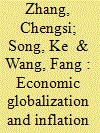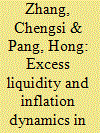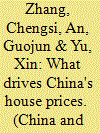| Srl | Item |
| 1 |
ID:
138901


|
|
|
|
|
| Summary/Abstract |
This paper evaluates whether globalization has increased the role of global factors in driving inflation in China. Unlike other published studies on the relationship between globalization and inflation, which mostly use Phillips curve models, this paper uses multivariate dynamic models to examine the dynamic interactions between globalization and inflation in China. Empirical results with quarterly data spanning from 1995 to 2012 show that the global output gap significantly affects the dynamics of inflation in China. In particular, the global output gap is superior to the domestic output gap in predicting domestic inflation. Impulse response and variance decomposition analyses reinforce this finding. Our results indicate that the central bank of China should take developments in global output into account in its monetary policy-making process.
|
|
|
|
|
|
|
|
|
|
|
|
|
|
|
|
| 2 |
ID:
082639


|
|
|
| 3 |
ID:
088488


|
|
|
|
|
| Publication |
2009.
|
| Summary/Abstract |
The recent financial market turmoil has initiated another search for insightful understanding of the interactions between the financial market and monetary policy. This paper explores these interactions in terms of the transmission mechanism of monetary policy in China. We argue that evolving financial development, enhanced by the expansion of the financial market, has altered the conventional channel for monetary transmission in China. Analyzing marked changes in the financial landscape and taking into account policy regime shifts in China, the paper provides clear evidence showing that the financial market has become a new and important channel for transmission of monetary policy in China.
|
|
|
|
|
|
|
|
|
|
|
|
|
|
|
|
| 4 |
ID:
182797


|
|
|
|
|
| Summary/Abstract |
This study examines how human capital in the financial sector affects corporate debt maturity. To illustrate the mechanisms underlying the effects, we propose a theoretical framework that highlights the effects of human capital in the financial sector on mitigating the information asymmetry between financial intermediaries, households, and firms. Using the Chinese National Economic Census in 2008 and the Industrial Enterprises Database over 2011–2013, we find that the financial sector's human capital plays a significant and positive (negative) role in short-term (long-term) debt and this effect is more pronounced for firms with greater information asymmetry. Further analyses demonstrate that the baseline findings are consistent with the credit supply hypothesis. Our study indicates that human capital in the financial sector strengthens its renegotiation capacity for corporate borrowing, which is consistent with China's financial repression policy and leads to increased exposure of firms to credit and liquidity risks.
|
|
|
|
|
|
|
|
|
|
|
|
|
|
|
|
| 5 |
ID:
096229


|
|
|
|
|
| Publication |
2010.
|
| Summary/Abstract |
This paper uses a stochastic volatility model, structural break tests with unknown point, and a counterfactual simulation method to discuss the significant decline in inflation uncertainty in China over 1978-2009. We attempt to quantify the contributions of better monetary policy and smaller structural shocks (including demand, supply and policy impacts) on the reduced inflation uncertainty. Empirical results in the present paper suggest that improved monetary policy accounts for only a small fraction of the reduction in inflation uncertainty from the pre-1997 period to the post-1997 period in China. The bulk of the significant moderation in inflation uncertainty arises from smaller shocks. This finding indicates that the quiescence of inflation in China over the past decade could well be followed by a return to a more turbulent inflation era. Therefore, the use of preemptive monetary policy to anchor inflationary expectations and keep moderate inflation uncertainty is warranted.
|
|
|
|
|
|
|
|
|
|
|
|
|
|
|
|
| 6 |
ID:
182771


|
|
|
|
|
| Summary/Abstract |
Whereas numerous studies have evaluated the effects of public research and development (R&D) support programs and R&D tax incentives on private R&D, little is known about local governments' fiscal incentives for R&D. In this study, we build a conceptual framework to clarify the critical role of local land supply in relation to fiscal expenditure on R&D. We treat the establishment of China's nine Land Supervision Bureaus in 2006 as a quasi-natural experiment, and run a difference-in-differences regression to identify causality. The results show that local governments allocate more fiscal expenditure to R&D in response to land-use supervision, which monitors illegal land granting behaviors, and this effect is stronger in cities where leaders have higher political career incentives and cities with greater fiscal decentralization. Moreover, we find that land-use supervision increases the probability and scale of firms' access to government subsidies for R&D; thus, enhancing regional innovation capacity. Our findings document that China's land resource is a curse for its innovation-driven growth as it impedes local governments' fiscal incentives for R&D.
|
|
|
|
|
|
|
|
|
|
|
|
|
|
|
|
| 7 |
ID:
076900


|
|
|
| 8 |
ID:
110250


|
|
|
|
|
| Publication |
2012.
|
| Summary/Abstract |
This paper examines empirically the Phillips curve relationship for the Chinese economy. We use quarterly data that go back to 1978 and employ a multivariate rather than univariate method in the construction of gap measures for inflation, money and output jointly with reliable error bands. Our empirical results show that the inflation gap and the output gap fit a New Phillips curve very well. We also find some structural change in the inflation-output trade-off.
|
|
|
|
|
|
|
|
|
|
|
|
|
|
|
|
| 9 |
ID:
113691


|
|
|
|
|
| Publication |
2012.
|
| Summary/Abstract |
The high and rising house prices in China are not adequately accounted for the traditional explanations emphasizing demand-driven or cost-push factors. Recent published studies claim that gender imbalance increases competition among men in the marriage market, which has pushed Chinese, especially parents with a son, to buy houses as a signal of relative status in the marriage market; this marriage competition then causes high demand for houses and eventually leads to rising house prices in China. Empirical results in this paper, however, provide little support for this hypothesis and we find that a rise in the sex ratios for most age cohorts accounts for very small percentage variations in house price movements in China during 1998-2009. Further investigation suggests that excess demand driven by high monetary growth was a significant cause of the rising house prices in China during 1998-2009. Therefore, the impact of gender imbalance on house prices should not be exaggerated and monetary dynamics remains an important leading indicator for house price movements in China.
|
|
|
|
|
|
|
|
|
|
|
|
|
|
|
|
| 10 |
ID:
105070


|
|
|
|
|
| Publication |
2011.
|
| Summary/Abstract |
This paper proposes that inflation in China during the post-reform era (1978 onwards) is always a monetary phenomenon. We construct a multivariate dynamic model based on Friedman's quantity theory of money and use the standard Granger causality test to show that money growth contains significant predictive power for inflation during the underlying period. The finding is robust to alternative measures of monetary aggregates and both closed and open economy frameworks. The baseline finding of the paper indicates that quantitative tools remain the most important policy instruments for China to manage its inflation effectively.
|
|
|
|
|
|
|
|
|
|
|
|
|
|
|
|